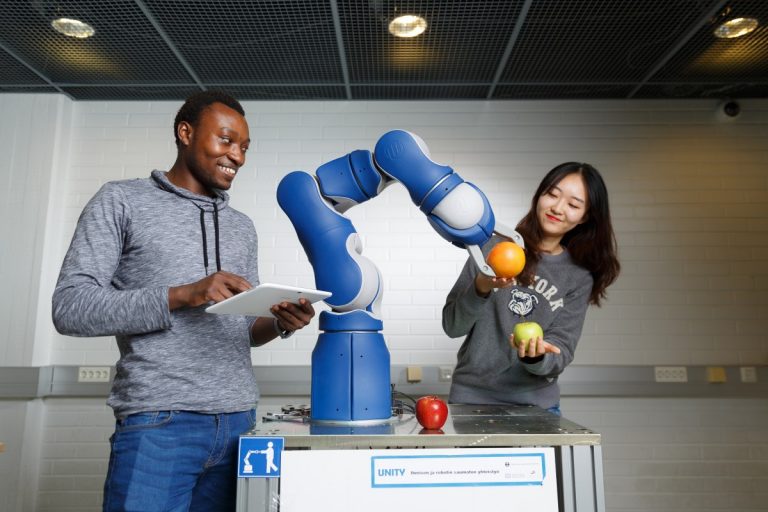
Living in a digital age makes it a prime time to consider a degree in computer science. With the widespread use of digital technology and the use of the World Wide Web, there’s an ever-growing need for qualified computer scientists. As the majority of industries evolve to include a range of internet technology, computer scientists will relish in an expansive choice of graduate roles.
It’s not only university applicants who are influenced by the rise of information technology; it’s also secondary and primary school pupils. Across the world, the Hour of Code global movement has been introduced to familiarise kids with the role of computer science. It’s a prodigious subject that involves creativity, logic and problem-solving skills. Involvement in this international trend is crucial while a higher-level qualification in the field will ensure you remain sought-after and relevant.
By enhancing your knowledge of this subject, you can also make an ethical contribution with your expertise. Society battles against a rising number of cyber-attacks each and every year, and the more trust we place in the technology that holds our personal data, the greater the potential damage.

According to a 2017 Annual Cybercrime report, cybercrime damages will cost the world US$6 trillion annually by the year 2021. Considering that mind-blowing figure, computer scientists are trying to up their numbers in an attempt to fight back. Over the next two decades, humanity is likely to face a global cyber crisis, so if you hope to use your studies for the greater good, then collaborating with an innovative computer science school could be the perfect route. A reputable education equals a golden ticket to the gateway of technological power. How you choose to use it is up to you.
Computer science schools in Europe are steadily-increasing in numbers. This probably has a lot to do with the advantages of diving into a diverse study hub. With so many students attending higher education institutes, there lies a strong emphasis on innovation and support.
Released in March 2017, The World Happiness Report indicates that seven out of 10 of the world’s happiest countries are in Europe. They base the results on key indicators such as health, social support, and trustworthy governance. When you choose your prospective university, it’s crucial that you also look into the location. You’re more likely to concentrate during complex computer science lectures if you’re comfortable and feel at home. Embellished with carved architecture and historical remains, Europe has something for every travel enthusiast. Plus, for those of you who are keen to get stuck in your studies, you’ll be happy to know that Europe’s tech scene is hotter than ever.
Here are 4 European Computer Science Schools that are technologically thriving…
DEPARTMENT OF COMPUTER SCIENCE, UNIVERSITY OF ANTWERP – BELGIUM
The University of Antwerp (UA) is situated in the vibrant historical city of Antwerp in Belgium. The university ranks tenth world-wide in the “50 under 50” QS World University Ranking of young universities. In the research-intensive Master of Computer Science programme teaching and research are tightly interwoven. The active UA Computer Science researchers offering the Master programme focus on three main research areas: software and systems, data science, and distributed systems and communication networks.

Software is everywhere, and innovation is essential to support its growing complexity. Researchers at Antwerp tackle the critical issues faced by businesses and organisations. To do so, they gain a better understanding of programming languages, design new techniques and build tools for modeling of complex Cyber-Physical systems as found in Industry 4.0, and work with industry to overcome the challenges of software maintenance.
Businesses and organisations also cope with large amounts of data which must be stored reliably and made accessible through software. Here, researchers specialise in organising and filtering datasets, as well as designing intelligent techniques that find patterns and models in large databases. This process, called data mining or pattern mining, is applied in software and algorithm design used for machine optimization, marketing strategies and fraud detection, but also to analyse complex biomolecular data, such as gene sets or protein sets.
Antwerp’s researchers are also bringing the Internet of Things (IoT) to the city of Antwerp, aiming to connect thousands of citizens with innovative applications that will significantly increase the quality of life in Antwerp. They also investigate wireless communication systems that use little power, designing models and tools for managing complex communication networks. Using simulations and modeling, Antwerp researchers study complex physical and biological systems.
FACULTY OF COMPUTING AND ELECTRICAL ENGINEERING, TAMPERE UNIVERSITY OF TECHNOLOGY – FINLAND

Tampere University of Technology (TUT) has built its syllabus around the future digital society. You’re spoilt for choice in this faculty, as students examine communications technologies, software engineering and signal processing in context of intelligent machines. But what places this faculty at the forefront is its new major in robotics and AI. As the first Finnish university to offer this as a major subject, the faculty has taken note of rising industry needs and added autonomous systems to its study structure.
As you can tell from the name, this school is devoted to teaching technology. By researching into ground-breaking designs, the institution aims to further understand our human needs and how they impact various fields of electrical engineering and computing. That’s why there’s an array of specialised laboratories for students to get involved with.
Interface, the school’s science magazine, is another accessible and informative resource connected to the faculty. In fact, they’ve published a very informative article about energy harvesting.
DEPARTMENT OF COMPUTER SCIENCE, KARLSTAD UNIVERSITY – SWEDEN
Back in 2014, Computer Science at Karlstad University was granted excellence status. As one of two excellent research groups at the university, it’s constantly filling up the research field with advanced knowledge and internal experts. As the Vice Chancellor of Karlstad University states, “one of the factors behind the group’s success is the international environment with members from many parts of the world, and where the differences in experience, knowledge and perspective generate new knowledge.”

The department has gained an outstanding global reputation and has successfully forged a network of research institutes from the ground up. Through Snits, students are in close collaboration with industrial partners and get the chance to build valuable relations throughout their course.
Computer Science at Karlstad University conducts prominent research in Computer Networking, Privacy and Security and Software Engineering. By studying within a tight-knit department, there’s a strong emphasis on the bond between students and teachers. An enhanced engagement with your tutor means that you’ll feel extra confident and at ease during your Karlstad experience.
SCHOOL OF ELECTRONICS, ELECTRICAL ENGINEERING AND COMPUTER SCIENCE, QUEEN’S UNIVERSITY BELFAST – UK
A key factor that sets this school apart from competition is its superior employment rate; over 85 percent of students find jobs within six months of graduation. This is down to first-class results and proactive engagement with the tech industry. Many graduates have expressed their gratitude to the school and have high hopes for a career in computing and electrical engineering.
Fixated on the future, the school has invested in a multi-million pound refurbishment of the Bernard Crossland building. The objective is to create a transparent and well-established space for computer science students, and many are excited to interact with this new, stimulating environment.
Queen’s University Belfast is one of the only UK universities participating in the Power Academy Scholarship scheme. With the chance to secure a scholarship worth over £25k, electronic engineering and electrical students have the exclusive opportunity to be sponsored by companies such as Mitsubishi, Siemens and Rolls Royce. This is a sure-fire way to future-proof your career.

*Some of the institutions featured on this article are commercial partners of Study International
Liked this? Then you’ll love these…
Leading UK Universities for Computer Science
Computer science is all the rage with students across the Asia Pacific







